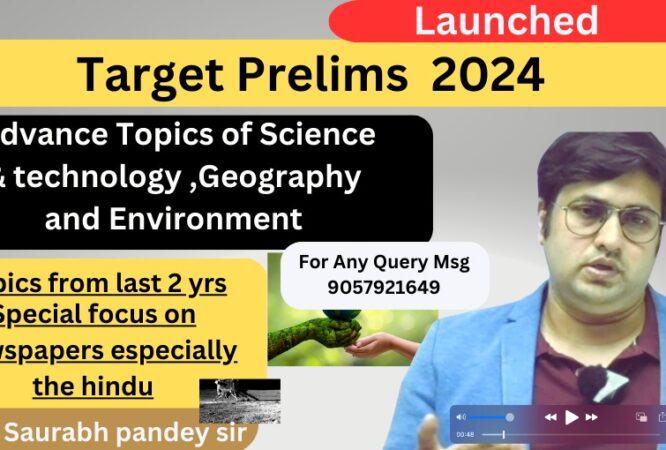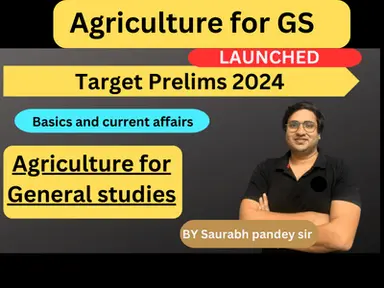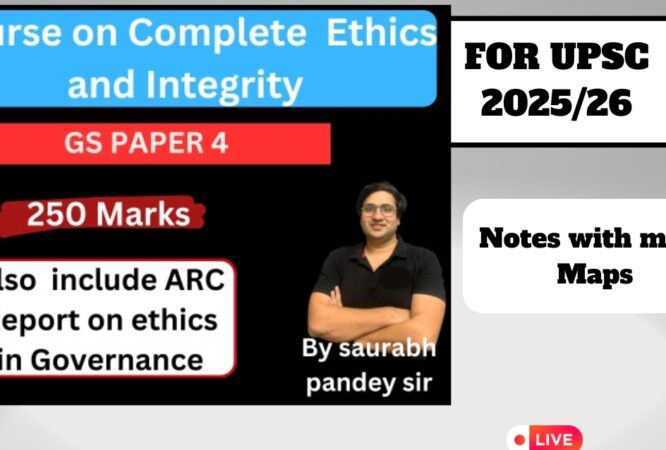UPSC Syllabus (IAS Exam Syllabus): What are the subjects that should be studied for the Civil Services Exam – Prelims, Mains, and the Interview?
UPSC Syllabus for Civil Service Exam (CSE) can be accessed and downloaded from this page. Aspirants may bookmark this page to refer to the latest syllabus for the Civil Services Exam, popularly known as the ‘IAS exam’.
UPSC CSE Syllabus: Decoded
With respect to the UPSC CSE syllabus, the Commission has provided an overview of the subjects or topics from which questions will be framed. For example, the History of India and the Indian National Movement is mentioned in the UPSC CSE Prelims syllabus.
However, this outline may not be adequate enough to get a holistic view of the UPSC syllabus for most of the IAS/IPS/IFS aspirants. To solve this problem, Saurabh Pandey UPSC has created hundreds of notes (study materials) by decoding and elaborating on each of the topics mentioned in the UPSC CSE Prelims and Mains syllabus.
Such explainer notes of Saurabh Pandey UPSC can be accessed as hyperlinks on this page. We believe this will help students save valuable time while preparing self-notes.
UPSC Syllabus – Civil Services Preliminary Exam
The Civil Services Preliminary exam comprises two compulsory papers of 200 marks each (General Studies Paper I and General Studies Paper II). The questions will be of multiple-choice, objective type. The marks in prelims will not be counted for the final ranking, but just for qualification for the main exam.
| Sl No. | Paper | Total Marks | Duration |
|---|---|---|---|
| 1 | General Studies Paper I (GS) | 200 | 2 hours |
| 2 | General Studies Paper II (CSAT) | 200 | 2 hours |
The Commission will draw a list of candidates to be qualified for the Civil Service (Main) Examination based on the criterion of minimum qualifying marks of 33% in General Studies Paper II of Civil Services (Preliminary) Examination and total qualifying marks of General Studies Paper-I of Civil Services (Preliminary) Examination as may be determined by the Commission.
| Details | General Studies Paper I | General Studies Paper II (CSAT) |
|---|---|---|
| Number of questions | 100 | 80 |
| Marks per question | 2 | 2.5 |
| Total Marks | 200 | 200 |
| Negative Marking | -0.66 marks for every incorrect answer. (ie. 1/3rd of the maximum marks for the question) | -0.83 marks for every incorrect answer. (ie. 1/3rd of the maximum marks for the question) |
| Significance | Counted for selection into the next stage (Mains). But not counted for the final ranking after Mains and Interview. | Not counted for selection into the next stage (Mains). This paper is qualifying in nature. However, the candidate needs 33% marks (67/200 marks) |
UPSC Syllabus for Paper-I – 200 marks
This objective paper is for a duration of two hours. There will be 100 questions. Marks of only this paper is counted to decide the toppers of the preliminary exam. The syllabus of GS Paper 1 is given below.
- Current events of national and international importance.
- History of India and Indian National Movement.
- Indian and World Geography – Physical, Social, Economic Geography of India and the World.
- Indian Polity and Governance – Constitution, Political System, Panchayati Raj, Public Policy, Rights Issues, etc.
- Economic and Social Development – Sustainable Development, Poverty, Inclusion, Demographics, Social Sector Initiatives, etc.
- General issues on Environmental Ecology, Bio-diversity and Climate Change – that do not require subject specialization.
- General Science.
UPSC Syllabus for Paper-II – 200 marks
This objective paper is for a duration of two hours. There will be 80 questions. Marks of this paper are counted to decide the toppers of the preliminary exam. This paper is only qualifying in nature. Aspirants just need to ensure that they score at least 33% marks in this paper. The syllabus of GS Paper 2 (CSAT) is given below.
- Comprehension.
- Interpersonal skills including communication skills.
- Logical reasoning and analytical ability.
- Decision-making and problem-solving.
- General mental ability.
- Basic numeracy (numbers and their relations, orders of magnitude, etc.) (Class X level).
- Data interpretation (charts, graphs, tables, data sufficiency etc. – Class X level).
UPSC Syllabus – Civil Services Mains Exam
A candidate’s rank in the UPSC Civil Service Exam depends only on the mark scored in the Main and Interview. The main exam has 1750 marks while the interview has 275 marks.
The written examination (main) will consist of the following nine papers, but only 7 papers will be counted for the final merit ranking. Each paper is for 250 marks. Thus the total mark for the Main exam is 1750.
For the rest two papers, the candidate should secure the minimum marks prescribed by UPSC each year. For each of the qualifying papers, it is usually 25% i.e. 75/300 marks.
| Paper | Subject | Marks |
|---|---|---|
| Paper-I | Essay | 250 |
| Paper-II | General Studies – I (Indian Heritage and Culture, History and Geography of the World and Society) | 250 |
| Paper-III | General Studies – II (Governance, Constitution, Polity, Social Justice and International Relations) | 250 |
| Paper–IV | General Studies – III (Technology, Economic Development, Biodiversity, Security and Disaster Management) | 250 |
| Paper–V | General Studies – IV (Ethics, Integrity and Aptitude) | 250 |
| Paper–VI | Optional Subject – Paper I | 250 |
| Paper–VII | Optional Subject – Paper II | 250 |
| Qualifying Paper A | Indian Language | 300 |
| Qualifying Paper B | English Language | 300 |
1. Paper‐I: (Essay) – 250 Marks
In Essay Paper, candidates may be required to write essays on multiple topics. They will be expected to keep close to the subject of the essay to arrange their ideas in an orderly fashion and to write concisely. Credit will be given for effective and exact expression.
2. Paper‐2: (General Studies 1) – 250 Marks.
General Studies 1 Paper Syllabus for UPSC Civil Services Mains Exam consists of the below major areas: Indian Heritage and Culture, History and Geography of the World and Society. The detailed syllabus is given below:
INDIAN CULTURE
- Salient aspects of Art Forms, Literature and Architecture from ancient to modern times.
MODERN INDIAN HISTORY
- Modern Indian history from about the middle of the eighteenth century until the present – significant events, personalities, and issues.
- The Freedom Struggle – its various stages and important contributors /contributions from different parts of the country.
- Post-independence consolidation and reorganization within the country.
WORLD HISTORY
Events from the 18th century such as:
- industrial revolution
- world wars
- redrawal of national boundaries
- colonization
- decolonization
- political philosophies like communism, capitalism, socialism etc. – their forms and effect on the society.
INDIAN SOCIETY
- Salient features of Indian Society
- Diversity of India
- Role of women and women’s organization
- Population and associated issues
- Poverty and developmental issues
- Urbanization: their problems and their remedies
- Effects of globalization on Indian society
- Social empowerment: communalism, regionalism & secularism.
WORLD GEOGRAPHY
- Salient features of the world’s physical geography
- Distribution of key natural resources across the world (including South Asia and the Indian subcontinent)
- Factors responsible for the location of primary, secondary, and tertiary sector industries in various parts of the world (including India)
- Important Geophysical phenomena such as earthquakes, Tsunami, Volcanic activity, cyclones etc.
- Geographical features and their location
- Changes in critical geographical features (including water bodies and ice-caps) and in flora and fauna and the effects of such changes.
3. Paper‐3: (General Studies 2) – 250 Marks
General Studies 2 Paper Syllabus for UPSC Civil Services Mains Exam consists of the below major areas: Governance, Constitution, Polity, Social Justice and International Relations. The detailed syllabus is given below:
POLITY
- Indian Constitution
- historical underpinnings
- evolution
- features
- amendments
- significant provisions and
- basic structure
- Functions and responsibilities of the Union and the States
- Issues and challenges pertaining to the federal structure
- Devolution of powers and finances up to local levels and challenges therein
- Separation of powers between various organs
- Dispute redressal mechanisms and institutions
- Comparison of the Indian constitutional scheme with that of other countries
- Parliament and State Legislatures
- Structure
- Functioning
- Conduct of business
- Powers & privileges and
- Issues arising out of these
- Structure, organization, and functioning of the Executive and the Judiciary
- Ministries and Departments of the Government
- Pressure groups and formal/informal associations and their role in the Polity
- Salient features of the Representation of People’s Act
- Appointment to various Constitutional posts, powers, functions, and responsibilities of various Constitutional Bodies
- Statutory, regulatory, and various quasi-judicial bodies
GOVERNANCE
- Government policies and interventions for development in various sectors and issues arising out of their design and implementation
- Development processes and the development industry- the role of NGOs, SHGs, various groups and associations, donors, charities, institutional and other stakeholders
- Important aspects of governance
- Transparency and accountability
- e-governance- applications, models, successes, limitations, and potential
- Citizen’s charters
- Transparency & accountability and institutional and other measures
- Role of civil services in a democracy
SOCIAL JUSTICE
- Issues relating to poverty and hunger
- Welfare schemes for vulnerable sections of the population by the Centre and States and the performance of these schemes
- Mechanisms, laws, institutions and Bodies constituted for the protection and betterment of these vulnerable sections
- Issues relating to the development and management of Social Sector/Services relating to Health, Education, Human Resources
INTERNATIONAL RELATIONS
- India and its neighborhood- relations
- Bilateral, regional and global groupings and agreements involving India and/or affecting India’s interests
- Effect of policies and politics of developed and developing countries on India’s interests
- Indian Diaspora
- Important International institutions, agencies and fora- their structure, mandate
- India’s soft power and cultural diplomacy
4. Paper‐4: (General Studies 3) – 250 Marks
General Studies 3 Paper Syllabus for UPSC Civil Services Mains Exam consists of the below major areas: Technology, Economic Development, Biodiversity, Environment, Security and Disaster Management. The detailed syllabus as provided by UPSC is as below:
General Studies 3 Paper Syllabus for UPSC Civil Services Mains
ECONOMIC DEVELOPMENT
- Indian Economy and issues relating to planning, mobilization of resources, growth, development and employment.
- Inclusive growth and issues arising from it.
- Government Budgeting.
- Land reforms in India.
- Effects of liberalization on the economy
- Changes in industrial policy and their effects on industrial growth.
- Infrastructure: Energy, Ports, Roads, Airports, Railways etc.
- Investment models.
AGRICULTURE
- Major crops cropping patterns in various parts of the country
- Different types of irrigation and irrigation systems storage
- Transport and marketing of agricultural produce and issues and related constraints
- e-technology in the aid of farmers
- Issues related to direct and indirect farm subsidies and minimum support prices
- Public Distribution System– objectives, functioning, limitations, revamping;
- issues of buffer stocks and food security
- Technology missions
- economics of animal-rearing.
- Food processing and related industries in India– scope and significance, location, upstream and downstream requirements, supply chain management.
SCIENCE AND TECHNOLOGY
- Developments and their applications and effects in everyday life
- Achievements of Indians in Science & technology
- Indigenization of technology and developing new technology.
- Awareness in the fields of IT, Space, Computers, robotics, nano-technology, bio-technology
- Issues relating to intellectual property rights.
BIODIVERSITY AND ENVIRONMENT
- Conservation
- environmental pollution and degradation
- environmental impact assessment
DISASTER AND DISASTER MANAGEMENT
- Disaster and disaster management
INTERNAL SECURITY
- Linkages between development and spread of extremism.
- Role of external state and non-state actors in creating challenges to internal security.
- Challenges to internal security through communication networks
- Role of media and social networking sites in internal security challenges
- Basics of cyber security
- Money-laundering and its prevention
- Security challenges and their management in border areas
- Linkages of organized crime with terrorism
- Various Security forces and agencies and their mandate.
5. Paper‐5: (General Studies 4) – 250 Marks
General Studies 4 Paper Syllabus for UPSC Civil Services Mains Exam consists of the below major areas: Ethics, Integrity, and Aptitude. Details of the syllabus as provided by UPSC is as below: This paper will include questions to test the candidates’ attitude and approach to issues relating to integrity, probity in public life and his problem-solving approach to various issues and conflicts faced by him in dealing with society. Questions may utilise the case study approach to determine these aspects. The following broad areas will be covered:
General Studies 4 Paper Syllabus for UPSC Civil Services Mains
ETHICS AND HUMAN INTERFACE:
- Ethics and Human Interface
- Essence, determinants, and consequences of Ethics in human actions
- Dimensions of ethics
- Ethics in private and public relationships
HUMAN VALUES
- Human Values
- Lessons from the lives and teachings of great leaders, reformers and administrators
- Role of family, society, and educational institutions in inculcating values
ATTITUDE
- Attitude: content, structure, function
- Attitude and its influence and relation with thought and behaviour
- Moral and political attitudes
- Social influence and persuasion
APTITUDE
- Aptitude
- Foundational Values for Civil Service
- Integrity
- Impartiality and non-partisanship
- Objectivity
- Dedication to public service
- Empathy
- Tolerance
- Compassion towards the weaker sections
EMOTIONAL INTELLIGENCE
- Emotional intelligence – concepts
- Utilities and application of Emotional Intelligence in administration and governance
MORAL THINKERS AND PHILOSOPHERS
- Contributions of moral thinkers and philosophers from India and the world
CIVIL SERVICE VALUES
- Public/Civil service values and Ethics in Public administration: Status and problems
- Ethical concerns and dilemmas in government and private institutions
- Laws, rules, regulations and conscience as sources of ethical guidance
- Accountability
- Ethical governance
- Strengthening of ethical and moral values in governance
- Ethical issues in international relations and funding
- Corporate governance.
PROBITY IN GOVERNANCE
- Probity in Governance
- Concept of Public Service
- The philosophical basis of governance and probity;
- Information sharing and transparency in government,
- Right to Information,
- Codes of Ethics
- Codes of Conduct
- Citizen’s Charters
- Work culture
- Quality of service delivery
- Utilization of public funds
- Challenges of corruption
CASE STUDIES
- Case Studies on the above issues.
6. Paper‐6: (Optional Subject Paper 1) – 250 Marks
7. Paper‐7: (Optional Subject Paper 2) – 250 Marks
Qualifying Paper A – Not counted for final ranking
Paper ‐ A – Indian Language – Syllabus. (One of the Indian Languages to be selected by the candidate from the Languages included in the Eighth Schedule to the Constitution. This paper will not be compulsory for candidates hailing from the States of Arunachal Pradesh, Manipur, Meghalaya, Mizoram, Nagaland and Sikkim.) 300 Marks.
Qualifying Paper B – Not counted for final ranking
Paper ‐ B – English Language – Syllabus. 300 Marks.
UPSC Syllabus – Civil Services Interview
- The candidate will be interviewed by a Board that will have before them a record of his/her career. He/she will be asked questions on matters of general interest. The object of the interview is to assess the personal suitability of the candidate for a career in public service by a Board of competent and unbiased observers. The test is intended to judge the mental calibre of a candidate. In broad terms, this is really an assessment of not only his/her intellectual qualities but also social traits and his/her interest in current affairs. Some of the qualities to be judged are mental alertness, critical powers of assimilation, clear and logical exposition, a balance of judgement, variety and depth of interest, ability for social cohesion and leadership, intellectual and moral integrity.
- The technique of the interview is not that of a strict cross-examination but of a natural, though directed and purposive conversation which is intended to reveal the mental qualities of the candidate.
- The interview test is not intended to be a test either of the specialised or general knowledge of the candidates which has been already tested through their written papers. Candidates are expected to have taken an intelligent interest not only in their special subjects of academic study but also in the events which are happening around them both within and outside their own state or country as well as in modern currents of thought and in new discoveries which should arouse the curiosity of well-educated youth.
Sub Total (Written test): 1750 Marks
Personality Test: 275 Marks
Grand Total: 2025 Marks





